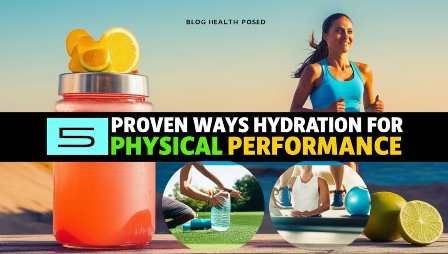In this article, I will demonstrate five proven strategies for maintaining hydration, a crucial aspect of physical health and performance.
Every single one of our body’s cells, tissues, and organs needs water to operate properly.
When you get your muscles working, you need more water. If you want to keep performing at your best when exercising, you need to drink plenty of water, as discussed in this blog article
.
Learn the function of water in your body.
Water, which makes up over 60% of our bodies, is essential for several reasons.
This allows for easier control of the body’s temperature through perspiration and evaporation.
Second, it lubricates the joints continuously so that they remain smooth and flexible.
Thirdly, it facilitates the delivery of oxygen and nutrients to different parts of the body via the circulatory system.
Urine, sweat, and feces all contribute to the body’s process of eliminating waste.
The aftermath of depletion in water resources
A lack of water in the body may cause pains and cramps in the muscles.
The body becomes dehydrated when it lacks water.
Here are some signs of severe dehydration:
1. Weakness and exhaustion: Dehydration leads to energy loss, which in turn brings weakness and exhaustion.
2. If you’re experiencing muscle soreness or cramps, it might be due to not drinking enough water.
3. Excessive thirst, which results from insufficient water intake, reduces the body’s efficiency.
4. Brain Function Issues: Dehydration may cause headaches, mood swings, and difficulty focusing.
Staying hydrated is essential for peak physical performance.
Staying well hydrated is essential for maximizing your physical performance.
Here are some of the more crucial ones:
Hydration during exercise improves performance and reduces weariness.
Also, drinking water after exercise can help your body recover faster, which means you’ll feel better sooner.
There is some evidence that water consumption might reduce inflammation and speed up the healing process in muscles.
You can stay active for extended periods of time when you drink plenty of water.
Staying hydrated enhances the effectiveness of weight training and other types of physical exercise by preserving muscle strength.
It helps to build stronger muscles.
Advice on Staying Hydrated
1. One must drink water regularly throughout the day, not just before, during, and after physical activity.
2. Consume produce that is rich in water, such as cucumbers, oranges, watermelons, and other fruits and vegetables.
3. Lastly, it’s recommended to have an electrolyte-rich sports drink before an intense workout if you anticipate perspiration.
4. Fourth, always have a supply of water available. A bottle of water is always on hand, so you may quench your thirst whenever you choose.
5. Cut down on alcohol and coffee; both might make you perspire more.
A lot of people wonder why it’s so important to drink lots of water for optimal physical performance.
1.Proper hydration facilitates maintaining energy, controlling temperature, and avoiding exhaustion during intense physical exercise.
2. How much water should I drink daily to achieve my fitness goals?
To compensate for the water you lose via sweating and the intensity of your exercise, drink 8 to 10 glasses of water daily.
3. Can dehydration affect my athletic performance?
It’s true that dehydration can negatively impact your strength, endurance, and mental acuity, potentially making achieving peak performance more challenging.
4. What are the most common unfavorable outcomes when water becomes scarce?
Headaches, vertigo, lethargy, dry skin, and decreased urine flow are very rare adverse effects. Extended periods of not drinking enough water might lead to further health problems.
5. What effects does not getting enough water have on focus and clarity of thought?
Dehydration can negatively affect a person’s ability to focus and think rationally, manifesting as brain fog, diminished attention, and poor cognitive performance.
6. What are the effects of chronic dehydration in the long run?
Chronic dehydration raises the risk of kidney stones, UTIs, and organ damage due to the body’s inability to retain adequate fluid.
7. What makes water a must-have during physical activity?
To maintain a steady blood volume, regulate core temperature, and replace fluids lost via sweating, staying hydrated is essential when exercising.
8. How often should you drink water while working out?
Drink 7-10 ounces of water every 15-20 minutes while exercising to ensure proper hydration.
9. What are the warning signs of dehydration during exercise?
Some of the symptoms that may appear include increased thirst, dry mouth, dizziness, muscle cramps, and dark urine. Pay close attention to these symptoms in order to avoid dehydration.
10. How does hydration impact muscle function?
A proper electrolyte balance is essential for the facilitation and prevention of cramping during muscle contractions, and staying hydrated helps with this process. It aids muscle recovery after exercise.
11. Is drinking water possible to prevent muscle cramps?
Electrolyte imbalances may cause muscle cramps and spasms during exercise, but you can mitigate this by consuming an adequate amount of water.
12. Will sports drinks help me stay hydrated?
Sports drinks may be helpful for intense workouts that continue longer than an hour since they include carbohydrates for sustained energy and electrolytes.
13. When might a sports drink be more beneficial than water?
Using a sports drink is the best way to replace the electrolytes lost through sweating, especially during long, intense workouts or in extremely hot weather.
14. Which sports drink is best?
A great approach to replenishing your energy and remaining hydrated is with a sports drink. Try to choose ones that are all-natural, have balanced electrolytes, and have little sugar.
To summarize
Staying well hydrated is essential for maximizing your physical performance. It serves the dual purposes of improving physical performance and speeding up recovery.
If you want to stay healthy and active, you should drink water often and consume foods that are rich in water content.

